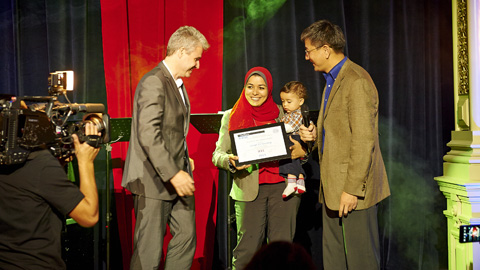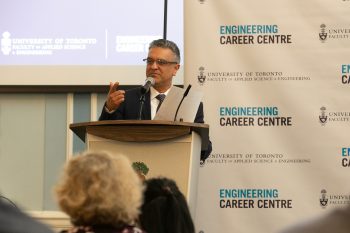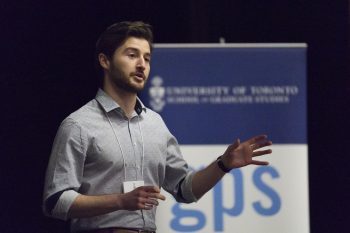
U of T Civil Engineering graduate Samah El-Tantawy, holding her son Yusuf, receives her first-place IEEE ITSS award for best PhD dissertation. From left: Professor Christoph Stiller, IEEE ITSS President; Samah El-Tantawy and Yusuf Abdelgawad; and, Professor Jason Geng, IEEE ITSS Vice President of Membership.
U of T Engineering graduate Samah El-Tantawy‘s PhD dissertation on developing a smart traffic light control system has won two prestigious international awards.
El-Tantawy’s system uses game theory and artificial intelligence to ‘teach’ lights in real time how to adjust to traffic patterns.
Her dissertation won first place this month in the best PhD dissertation competition from the Institute of Electrical and Electronics Engineers (IEEE) Intelligent Transportation Systems Society (ITSS). El-Tantawy (CivE PhD 1T2) also won second place from The Institute of Operations Research and Management Sciences (INFORMS) for its George B. Dantzig Dissertation Award.
“Everyone understands the impact of traffic congestion,” said El-Tantawy, who was inspired by watching snarled traffic in Toronto and in her hometown of Cairo, Egypt. “It affects the environment, the economy and society in general.”
Existing traffic light systems use sensors embedded in the pavement leading up to the intersection to send data to and from a central management centre. The centre then sends signals back to adjust the lights’ timing.
El-Tantawy’s system processes data on-site and in real-time, avoiding data-transmission delays. It also avoids the system-wide chaos that would result if the central management centre broke down.
In addition, current systems monitor traffic patterns along a single road – either east/west or north/south. El-Tantawy’s system lets traffic lights use data from all directions, creating more responsive timing for grid-like transportation networks. It even allows lights to ‘talk’ to each other to create the optimum traffic flow in a given geographical area.
El-Tantawy, who worked under the supervision of Professor Baher Abdulhai (CivE), Director of the Toronto Intelligent Transportation Systems Centre and Testbed, has high praise for her supervisor’s role in helping her win the awards.
“He has the critical thinking skills that made me think outside of the box,” she said. “But he was not only supportive on technical matters; he also encouraged me through his positive energy.”
“I offer my heartfelt congratulations to Samah El-Tantawy for being recognized for her innovative PhD dissertation,” said Cristina Amon, Dean, Faculty of Applied Science & Engineering. “Her development of the smart traffic light control system is an excellent example of the creativity and global leadership of U of T Engineers.”
Professor Abdulhai and Dr. El-Tantawy have made headlines for developing the system for which she won the awards. It is known as MARLIN-ATSC, for Multi-agent Reinforcement Learning for Integrated Network of Adaptive Traffic Signal Controllers.
Tests of the MARLIN system on 60 downtown Toronto intersections at rush hour showed a reduction in delays of up to 40 per cent. The test also showed MARLIN cut travel times by as much as 26 per cent.
“Samah’s PhD is simply impressive, a role model for all PhD students,” said Professor Abdulhai. “I am certainly proud of her achievements, and I hope my whole team follows suit.”
The U of T Engineering system, which costs between $20,000 and $40,000 per intersection to install, has attracted interest from the traffic signal control industry, says El-Tantawy.
If all goes well, she hopes her next step will be to help implement the technology in the field.



